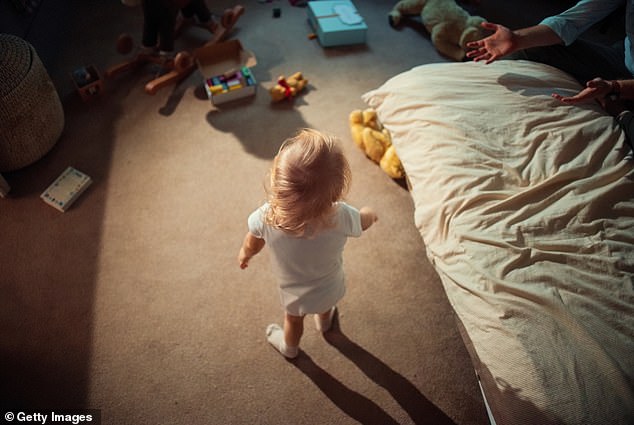Have you seen the ‘5 to 9’ trend on social media? Popular among Gen Z, it involves people sharing videos of their early morning routines – between 5am and 9am – which normally include lighting candles, exercise, journaling and many minutes spent crafting the perfect matcha latte.
Unfortunately there is a whole separate group of 5am-ers who are having a less Instagrammable time as dawn breaks: parents of young children. For the past six months, my second child (now 18 months) has regularly risen for the day between 4.30am and 5.30am, and our #5to9 features nappy changes, climbing the sofa, playing with Duplo, and a fair amount of crying (from all parties involved). Often I’ve found myself visiting the playground as the sun rises, or pushing the buggy around waiting for my local coffee shop to open at 6am.

Early waking is a common problem with babies and toddlers but one solution could be putting them to bed sooner

Rosey Davidson, a renowned baby sleep consultant and founder of Just Chill Baby sleep, has worked with celebrity clients including Joe Wicks and Rebecca Adlington
With my husband and I both working full-time alongside raising our two kids, the early mornings put serious strain on our already exhausting schedules. We take it in turns to do the dreaded 5am shift, but are both so knackered that we go to bed not long after the children, so it feels like there’s never a minute of the day that’s not consumed by working or parenting.
Tiredness inevitably leads to snappiness and brain fog, which is not conducive to a happy family or work life. After many months hoping the problem would magically resolve itself, I knew we needed to take decisive action.
Enter Rosey Davidson, a renowned baby sleep consultant and founder of Just Chill Baby sleep, who has worked with a whole host of celebrity clients including Joe Wicks and Rebecca Adlington. She has a podcast and a whopping 343,000 followers on Instagram, where she shares concise tips for dealing with all manner of sleep issues. Yet despite Rosey’s credentials, part of me still couldn’t quite believe my son’s early waking wass fixable. Perhaps he’s just a morning lark rather than a night owl, and his wake-up time is inbuilt?
Rosey and her small team offer various one-to-one sleep packages, starting from £95 for a 30-minute phone consultation and personalised action plan. I opted for the ‘slumber package’, which involves an hour-long chat on the phone with Rosey, a sleep action plan and two weeks’ WhatsApp support. At £415, it’s not cheap, but when it comes to sleep the question really comes down to this: what price do you put on your sanity?
During our phone call, I explain our nightly routine to Rosey. First up, putting my son to bed around 6.30pm when he seems very tired (I’ve read online that if you wait until they are overtired it will lead to bad sleep and earlier waking). Before bed he has a bath, story and bottle. A few hours later, we give him a ‘dream feed’ (a habit we got into when he was tiny), with the hope that the extra bottle of milk will keep him full enough to sleep until morning. If he wakes in the night, I rush to his room to pop his dummy back in, as I don’t want the crying to wake my five-year-old daughter. Ditto in the morning – when he wakes full of beans, I quickly pluck him out of the cot so he doesn’t disturb everyone, and head downstairs for breakfast.

Sophie thought perhaps her son was just a morning lark rather than a night owl, and his wake-up time was inbuilt
Rosey’s advice? The bottle at night needs to go (in fact, at my son’s age, we should be phasing out bottles altogether). By waking him up a 9.30pm, I’m actually disturbing his sleep, and making him too reliant on liquid calories during the night, rather than solid food during the day. All that milk also leads to an extra-full nappy in the early morning, which won’t help with keeping him comfortable and sleepy.
The bedtime needs to move back too, says Rosey, as there’s only so many hours of sleep I can expect my son to have at night. This might sound like extremely obvious advice, but I’m surprised by it, because – as I mentioned – I’ve read so many Mumsnet threads and online articles saying ‘if they wake early, you put them to bed earlier!’ The amount of parenting advice online is completely overwhelming, which is no doubt why parents are increasingly turning to experts such as Rosey to cut through the noise. It’s exhausting trawling through conflicting information and trying to work out the ‘correct’ thing to do, which is why paying someone to take charge of the situation and give you a personalised plan is a huge relief.
As well as pushing my son’s bedtime back to 7.30pm, Rosey suggests combining his bathtime and story routine with my daughter’s, in order to lighten my own load. I have previously dealt with him first, then started her entire bedtime routine straight after; perhaps that’s why I was very unsurprised by a new report from CBeebies Parenting that found mums and dads are spending an ‘exhausting’ 15 days a year on bedtime routines. Rosey also advises me not to rush in if my son wakes in the night or first thing in the morning, to push back breakfast so he’s not waking at 4.30am expecting food, and to add an extra blackout curtain behind the existing blind in his room (to stop those sneaky sun rays that creep around the edges).
When Rosey tells me she’s confident that we can get the issue sorted within a fortnight I’m excited, but it also sounds too good to be true. After all, I’ve tinkered around with some of these ideas before – tweaking the bedtime here, dropping the odd bottle there – and it hasn’t made a difference. ‘A mistake people often make is doing something once, then deciding it doesn’t work and immediately abandoning it’ Rosey explains. Instead, consistency is key when it comes to infant (and indeed adult) sleep. I put up the extra blackout blind, share Rosey’s action plan with my husband and cross my fingers.
Keeping my son up past 7pm that night isn’t the tantrum-filled hell I anticipate – in fact he seems thrilled to be sitting in bed with his older sister for story time. It’s also a big relief not to have to worry about preparing a bottle and changing his nappy at 9.30pm; I can just go straight to bed, skipping the night feed. When my son wakes the next day at 6.45am – two hours later than his usual wake-up – I can hardly believe it. Surely sorting his sleep issues can’t be done that easily?

‘When my son wakes the next day at 6.45am – two hours later than his usual wake-up – I can hardly believe it,’ says Sophie
Well, it’s not entirely straightforward, which is why having the WhatsApp support for the next two weeks is very helpful. I’m able to message Rosey with issues that crop up along the way: What should I do to stop him falling asleep pre-bedtime in the car? (As every parent knows, this counts as a major disaster). Keep the window open and don’t have him too warm, says Rosey. How can I make the room more comfortable during a heatwave? Rosey suggests various options: take the blackout blind down and open the window for the few hours between his bedtime and when I go to bed, to cool the room down without sacrificing the light-blocking blind, or invest in a portable air-con unit or special fan that has ice blocks in it, for extra cooling power.
One thing I really like is that Rosey is realistic about family life and not too rigid in her rules. When I ask her if it’s okay for him to nap in the buggy instead of the cot so I can meet friends in Battersea Park, I expect her to say I should definitely take him home, but instead she tells me ‘it’s fine – it’s important for you to enjoy your weekend’.
Having an expert on call to help with all my random parenting questions feels incredibly comforting. I imagine years ago, when people lived closer to their extended families, it was the type of advice you’d have gotten from your mum, aunts and grandmothers. Although I have lots of parent friends nearby, it’s not quite the same as having my own mother down the road ready to dispense advice, and I’m not alone in living far from my ‘village’. While some older generations might roll their eyes at millennials seeking out expensive ‘consultants’ for all manner of child-rearing, it’s hardly surprising given the world in which we’re operating: overloaded with conflicting advice online, and often without a trusted voice to turn to.
By the end of the two weeks, I feel like a new woman. My son is consistently waking up between 6.30am and 7am, which may sound early if you don’t have young kids, but is a godsend to me. My mood is lighter, my husband and I grumble at each other less, and I finally have time to get up before the kids and tackle some life admin early in the day, which makes everything feel more manageable. Even just having five minutes to myself to have a cup of tea in peace is a big psychological boost. You only realise how important sleep is when you’re not getting enough of it, and it if takes paying several hundred pounds for a phone call and some WhatsApp messages to solve that, it’s money extremely well spent.
Rosey Davidson on the five most common mistakes parents make when it comes to baby sleep
1 Thinking all sleep challenges are fixed by changing bedtime
It’s a common belief that adjusting bedtime earlier or later will magically solve sleep issues – but sleep is influenced by a lot more than just the clock. Factors like sleep pressure, emotional regulation, sensory needs, and connection all play a role. Focusing solely on the time without looking at the bigger picture can lead to frustration.
2 Jumping in too quickly at every noise
It’s so normal to want to help straight away, but babies (and older children) often make noises or even cry briefly between sleep cycles. If we rush in too fast, we may accidentally interrupt their natural process of resettling. Pausing for a moment can make a big difference.
3 Trying to ‘teach’ sleep before laying the foundation
Sometimes there’s a rush to fix sleep by using techniques like sleep training without first understanding what’s going on. Is your child getting enough sensory input in the day? Do they feel safe and connected? Are their sleep needs biologically appropriate for their age? Are we trying bedtime at the right time for them? If we skip the groundwork, no method will work well – or feel good.
4 Changing too many things at once
When sleep is tricky, it’s tempting to overhaul everything – routine, bedtime, sleep space – all at the same time. But this can confuse a child and make it hard to tell what’s actually helping. Making small, consistent changes is often more effective in the long run.
5 Neglecting connection time before bed
Many sleep struggles are actually rooted in a child’s need for connection. Skipping quality one-on-one time before bed can lead to bedtime battles or frequent wake-ups. Even 10–15 minutes of undivided attention, cuddles, or play before the bedtime routine can go a long way.












